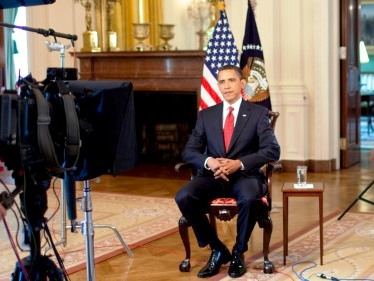
"Our auto industry is the foundation for economies all across the Midwest, and ultimately, for the country as a whole."
President Obama defended Federal help for the auto industry in an interview with C-SPAN aired on Saturday morning.
The aid has been under attack in various forms since it was establish by President Bush late last year when the U.S. financial system collapsed from its wild speculative practices, bringing the economy down with it.
As a result, current vehicle sales haven’t been at such low levels for more than four decades, and show no signs of improving this year.
In response to a question from C-SPAN political editor Steve Scully about “Government Motors” the President said, “Well, you know – look we are trying to help an auto industry that is going through a combination of bad decision making over many years and an unprecedented crisis — or at least a crisis we haven’t seen since the 1930’s. And you know the economy is going to bounce back and we want to get out of the business of helping auto companies as quickly as we can. I have got more than enough to do without that…”
General Motors Corporation confirmed late Friday borrowed an additional $4 billion from taxpayers to maintain adequate liquidity as the company undergoes what it calls an “aggressive restructuring.” Total U.S. Treasury funding received by GM to date is now $19.4 billion. The amount is paltry compared to the ongoing bailouts of financial institutions, but all told the bailout is now shaping up to cost taxpayers about $45 billion, and rising.
The President went on to say that both banking and autos are strategic industries that require strategic decisions and intervention from the government because of the ongoing economic crisis.
“Our auto industry is the foundation for economies all across the Midwest, and ultimately, for the country as a whole and had we allowed GM or Chrysler simply to liquidate that would have been a huge anti-stimulus on the economy as a whole, and could have dragged us even deeper into recession or even depression,” President Obama said.
“Ultimately, I think that GM is going to be a strong company and we are going to be pulling out as soon as the economy recovers and they’ve completed their restructuring,” Obama said.
As TDB reported Friday, nearly 40 Senators, including both Republicans and Democrats, lent their names to an amendment to an appropriations bill, sponsored by Kay Bailey Hutchison, a Republican from Texas, that would have blocked federal aid for the two makers if steps weren’t taken to ease the pain facing close to 2,000 dealers GM and Chrysler intend to fire as part of their restructuring plans. The Republican Party claims to help smaller businesses, and dealers are big political contributors.
Up until then bailout criticism was just talk, with the political bunkum coming mostly from Southern politicians trying to protect and bolster their non-unionized auto plants owned by off-shore makers. But now a potential threat to blocking Government action was enough to provoke a lengthy answer from the President that is not typical for a TV interview.
Obama said: “Well, my hope is, is that we will see both GM and Chrysler having emerged from this restructuring process leaner, meaner, more competitive with a set of product lines that appeal to consumers, good cars that are fuel efficient and that look at the markets of tomorrow.
“Keep in mind what’s happened in the auto industry. Right now, we’re seeing – we’re projecting that maybe this year the auto industry as a whole sells 10 million cars in the United States. Well, replacement numbers for the auto industry, you know, that the number of cars to replace cars on the road is closer to 14, 15, 16 million. And what that means is when the economy recovers and consumers say, you know the old clunker has finally given out. I need to get a new car.
“You are looking at a substantial market that is going to be available for U.S. automakers if they’ve made some good decisions now, and if they are building the kinds of fuel efficient, high performance cars that American consumers are hungry for.
“I think GM and Chrysler can do that. I think they have been weighed down by a legacy of some bad management decisions, health care costs and the whole host of other things that they are now in the process of cleaning up.
“We’re confident that they can emerge and take advantage of that new market and actually be very profitable and thrive, but it means going through some pain now, and the thing I worry about most is that so much of that pain is borne by workers and communities that have historically been the backbone of the auto industry and so we’re going to have to work intensely with those communities.
“If some of those auto jobs don’t come back, then what we’ve going to have to do is make sure that those workers are effectively retrained. We’ve got to make sure that those communities are supported that we are promoting green energy and green jobs as an alternative manufacturing base for many of these communities and that’s going to be one of the single-minded focuses of this administration.”
While much of the debate about the collapse of the auto industry has concerned blue collar workers, little discussion has been spent on the white collar aspects of the ever expanding unemployment problem. It is not at all clear that these professionals, many with advanced degrees in areas specific to auto manufacturing, can be retrained. Much of the development work on small cars is already performed overseas. Why it would shift here and create jobs is a murky promise, as is the assertion that the electrification of cars will revive the U.S. industry. The President might by dealing with the problems caused by the ongoing collapse for longer than he thinks.
